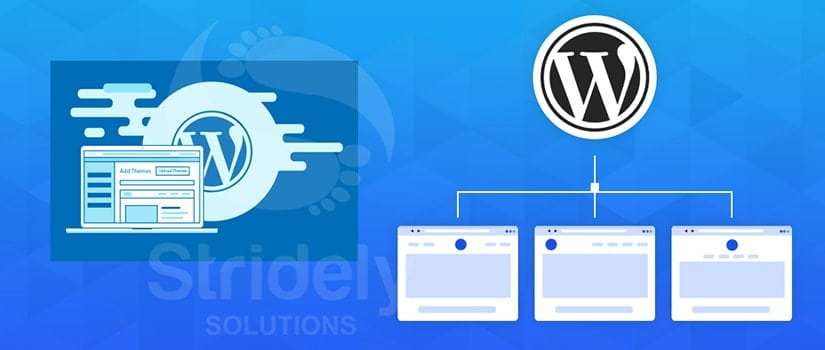Designing and developing websites for a business is no longer the topic of debate. The need to digitize the business economy while giving users the ease to shop, alone justifies the creation of a website. Thanks to the prevalence of WordPress, business owners can now easily create and manage websites without having the need to manually design and incorporate features.
WordPress being of the most common content management platform offers a vast repository of plugins and themes, designed to help entrepreneurs create compelling websites. Also, the admin portal of the website is user-friendly, aiding swift management of backend processes.
Often, organizations have multiple products and services and it is seen that they prefer having distinct websites for each. For instance, consider a business dealing in electronics, automobile, and fashion products. Instead of stuffing all in a single site, business owners prefer having different sites for each. Now, this is extremely beneficial as users can individually refer to a site.
The problem arises in managing and monitoring the site. Every time there is an update, the developer would need to log in to the sites individually, and make changes. Switching between different portals now and then, creating a mess and is also inconvenient.
This is where the idea of multisite CMS pops in.
WordPress as Multisite CMS
For organizations that have more than one business website, hosting them on different platforms is a tedious task. WordPress allows such business owners to have a single WordPress registration and use it to host more than one website.
There exists a single database and all of the details from the websites are stored in it distinctly. In case, you are wondering why business entrepreneurs should opt for multisite CMS, the list can be exhaustive. Yet, we are here outlining the benefits of using multisite WordPress CMS to host all your business websites.
-
A Central Repository To Manage All Assets
One of the common and the promising advantages of using multisite WordPress CMS is the fact that it comes with a centralized repository to store and manage all assets. Imagine that you have three different websites but the content embedded in the form of blogs, videos and audios remains the same. In such a case, managing them separately is difficult, let alone the fact that this creates duplicate data.
On the contrary, WordPress multisite CMS leads to the creation of a single database that stores all kinds of data. This in a way eliminates all possibility of redundant information and at the same time, eases the job of maintaining assets. Changes made in one set are automatically updated across all websites.
-
A Site Registration
Whether it is about registering for different sites or uploading themes or releasing an update, the WordPress multisite CMS is the one-stop-shop solution for all. When you have more than one website for your business, you need to keep track of each of them separately ensuring that none of them are outdated or requires an update. Manually checking every site consumes a great amount of time, not to mention the efforts spent in switching between the admin panel.
The Solution
To ease the above, WordPress multisite CMS offers the ability to host all of the websites on a single registration. So, the next time you need to update a theme or upgrade a plugin, you can do it all in a single step. A single installation or up-gradation would reflect the changes in all of the hosted websites automatically.
-
One-Click Backup
Working with websites, security is an important concern. It is advised that the entire website is updated and all of the data backed up in case the website stops functioning. Now imagine the time and efforts it would take to back up each of the sites individually. Yes, that huge.
On the other hand, using WordPress multisite CMS, you can update and create the back up of all of the hosted websites in a single click. All of the files are stored in one step saving both time and resources.
-
Beneficial For The Employees
It is not just you who undergoes the pain of monitoring different sites but also the employees within the organization. Distinct databases for different sites but for the same business makes it tough for the employees to track and assess data. Also, it becomes harder in terms of analyzing the sales and performance of the business as data is discreetly present and is redundant.
Odds of Using WordPress Multisite CMS
True that there are multiple benefits but that’s just one side of the coin. Using WordPress multisite CMS also comes with several disadvantages with the common ones being:
-
Plugin compatibility:
Hosting websites on the WordPress multisite CMS limits the plugins that can be used or integrated within the website. It is seen that the majority of the plugins are designed to support single-site functionality and turn obsolete in WordPress multisite CMS.
-
Admin Powers:
Individual admin no longer has the power to make changes in the same, let alone modify them.
-
Single Attack Impacts All:
Since all of the sites are hosted in a single platform, a single attack or a data breach would infect all of the websites compromising their safety and data privacy.
-
Speed Issues:
If one of the sites experiences huge traffic, the speed or the load time of pages of another website dramatically suffer.
-
Hosting Plans:
Similar to the plugins, not all hosting plans extend their support towards WordPress multisite CMS. Before deciding on whether to opt for a multisite site or not, make sure you have selected the right plan for hosting.
The Final Word
True that WordPress multisite CMS has its own set of drawbacks and is definitely not one size that fits all solution. Yet if you have more than one business website and find it hard to maintain each of them separately, it serves the purpose best. It not only centralizes all of the business information but also maintains accuracy in the records stored, making it easier to monitor the same.


